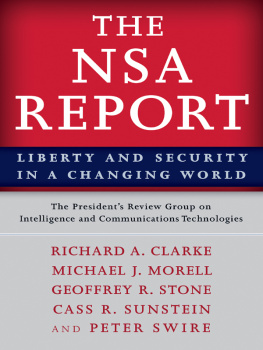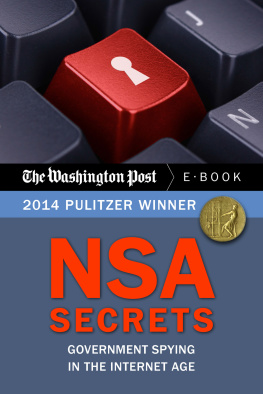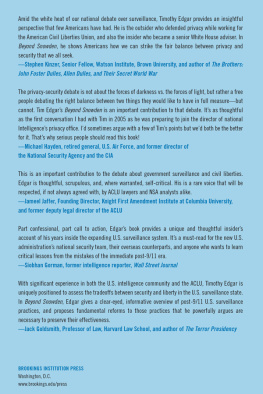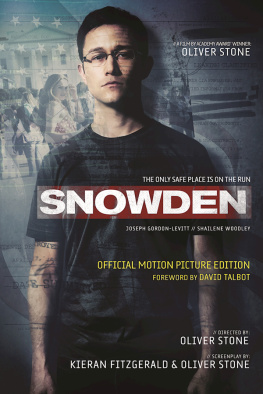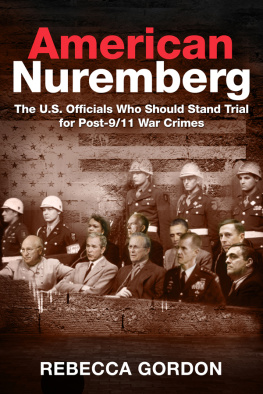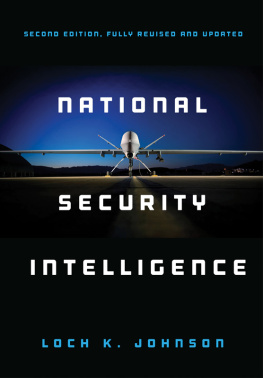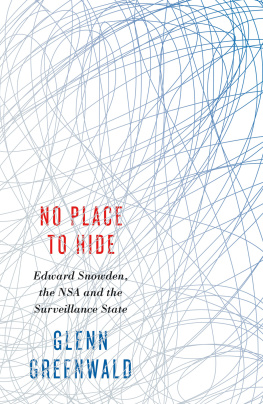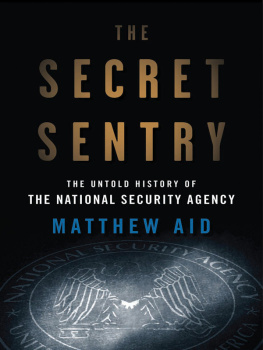
The NSA Report tackles some of the most important civil liberties issues of our era. Whether or not you agree with all of its recommendations, it is simply an outstanding introduction to the subject.
Jack M. Balkin, Yale Law School
The Review Boards recommendations on protecting the civil liberties of non-US personsa relatively new aspect of the policy discussionare incredibly welcome.
Jennifer Granick, Stanford Center for Internet and Society
The Snowden revelations have prompted many people to wonder about what is going on, and what could be done to stop the surveillance infrastructure without crippling the nations ability to interdict acts of terror. This report, written by world-class experts, provides a valuable explanation and assessment of the situationand how best to address it. It could turn into the seminal report on the issuean issue central to liberal democracy.
Viktor Mayer-Schnberger, University of Oxford
This is an extraordinarily important report, reflecting a synthesis of viewpoints from luminaries in the fields of law, privacy, and national security. The reports recommendations are serious and extensive and will continue to influence the U.S. and other governments as they grapple with the problems and opportunities raised by all-pervasive surveillance.
Frank Pasquale, University of Maryland
The NSA Report
The NSA Report
LIBERTY AND SECURITY IN A CHANGING WORLD
THE PRESIDENTS REVIEW GROUP
ON INTELLIGENCE
AND COMMUNICATIONS TECHNOLOGIES
RICHARD A. CLARKE
MICHAEL J. MORELL
GEOFFREY R. STONE
CASS R. SUNSTEIN
AND PETER SWIRE
PRINCETON UNIVERSITY PRESS
Princeton and Oxford
Proofreading, composition, and indexing of the Princeton University Press
Edition copyright 2014 by Princeton University Press
No copyright is claimed for the original text of Liberty and Security in a Changing World: Report and Recommendations of The Presidents Review Group on Intelligence and Communications Technologies, first issued December 12, 2013.
Requests for permission to reproduce material from this work should be sent to Permissions, Princeton University Press
Published by Princeton University Press, 41 William Street, Princeton, New Jersey 08540
In the United Kingdom: Princeton University Press, 6 Oxford Street, Woodstock, Oxfordshire OX20 1TW
press.princeton.edu
All Rights Reserved
Cover and interior design by Marcella Engel Roberts
Library of Congress Cataloging-in-Publication Data United States. The Presidents Review Group on Intelligence and Communications Technologies, issuing body
[Liberty and security in a changing world]
The NSA report : liberty and security in a changing world / The Presidents
Review Group on Intelligence and Communications Technologies;
Richard A. Clarke, Michael J. Morell, Geoffrey R. Stone, Cass R. Sunstein, Peter Swire.
pages cm
Includes index.
ISBN 9780691163208 (pbk. : alk. paper) 1. Intelligence serviceLaw and legislationUnited States. 2. Electronic surveillanceLaw and legislationUnited States. 3. National securityLaw and legislationUnited States. 4. Data protectionLaw and legislationUnited States. 5. United States. National Security Agency. I. Clarke, Richard A. (Richard Alan), 1951, group member. II. Morell, Michael J., group member. III. Stone, Geoffrey R., group member. IV. Sunstein, Cass R., group member. V. Swire, Peter P., group member. VI. Title.
KF4850.U54 2014
353.1'70973dc23
2014001797
British Library Cataloging-in-Publication Data is available
This book has been composed in Sabon Next LT Pro
Printed on acid-free paper.
Printed in the United States of America
1 3 5 7 9 10 8 6 4 2
Transmittal Letter
Dear Mr. President:
We are honored to present you with the Final Report of the Review Group on Intelligence and Communications Technologies. Consistent with your memorandum of August 27, 2013, our recommendations are designed to protect our national security and advance our foreign policy while also respecting our longstanding commitment to privacy and civil liberties, recognizing our need to maintain the public trust (including the trust of our friends and allies abroad), and reducing the risk of unauthorized disclosures.
We have emphasized the need to develop principles designed to create strong foundations for the future. Although we have explored past and current practices, and while that exploration has informed our recommendations, this Report should not be taken as a general review of, or as an attempt to provide a detailed assessment of, those practices. Nor have we generally engaged budgetary questions (although some of our recommendations would have budgetary implications).
We recognize that our forty-six recommendations, developed over a relatively short period of time, will require careful assessment by a wide range of relevant officials, with close reference to the likely consequences. Our goal has been to establish broad understandings and principles that can provide helpful orientation during the coming months, years, and decades.
We are hopeful that this Final Report might prove helpful to you, to Congress, to the American people, and to leaders and citizens of diverse nations during continuing explorations of these important questions.
Richard A. Clarke
Michael J. Morell
Geoffrey R. Stone
Cass R. Sunstein
Peter Swire
Acknowledgments
T HE R EVIEW G ROUP WOULD LIKE to thank the many people who supported our efforts in preparing this Report. A number of people were formally assigned to assist the Group, and all performed with professionalism, hard work, and good cheer. These included Brett Freedman, Kenneth Gould, and other personnel from throughout the government. We thank as well the many other people both inside and outside of the government who have contributed their time and energy to assisting in our work.
Contents
Preface
O N A UGUST 27, 2013, THE P RESIDENT announced the creation of the Review Group on Intelligence and Communications Technologies. The immediate backdrop for our work was a series of disclosures of classified information involving foreign intelligence collection by the National Security Agency. The disclosures revealed intercepted collections that occurred inside and outside of the United States and that included the communications of United States persons and legal permanent residents, as well as non-United States persons located outside the United States. Although these disclosures and the responses and concerns of many people in the United States and abroad have informed this Report, we have focused more broadly on the creation of sturdy foundations for the future, safeguarding (as our title suggests) liberty and security in a rapidly changing world.
Those rapid changes include unprecedented advances in information and communications technologies; increased globalization of trade, investment, and information flows; and fluid national security threats against which the American public rightly expects its government to provide protection. With this larger context in mind, we have been mindful of significant recent changes in the environment in which intelligence collection takes place.
For example, traditional distinctions between foreign and domestic are far less clear today than in the past, now that the same communications devices, software, and networks are used globally by friends and foes alike. These changes, as well as changes in the nature of the threats we face, have implications for the right of privacy, our strategic relationships with other nations, and the levels of innovation and information-sharing that underpin key elements of the global economy.
Next page
